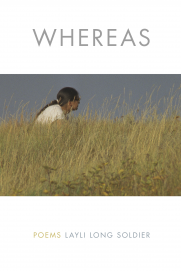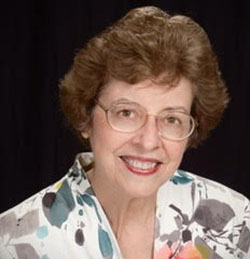Carole Mertz
 In Whereas by Layli Long Soldier, you encounter the pain of one who wishes to honor her disenfranchised people and her people’s lands and rights. Some of the poems in Part I, “These are the Concerns,” are written as prose poems, some as resolutions, some as word pictographs (such as “This is how you see me…,” where the content is set in an outline of a square, which brings to mind the fertile American Indian directional concepts of North-South-East-West). In “though I’m told…”, as in many of her poems, Long Soldier uses deliberately fractured sentences. Another “shape poem” presented in right alignment reads:
In Whereas by Layli Long Soldier, you encounter the pain of one who wishes to honor her disenfranchised people and her people’s lands and rights. Some of the poems in Part I, “These are the Concerns,” are written as prose poems, some as resolutions, some as word pictographs (such as “This is how you see me…,” where the content is set in an outline of a square, which brings to mind the fertile American Indian directional concepts of North-South-East-West). In “though I’m told…”, as in many of her poems, Long Soldier uses deliberately fractured sentences. Another “shape poem” presented in right alignment reads:
be
cause
when I
sweat over
diction James
Welch guides me
his angle a marginal
slope corner arrange
ment:
In its layout suggesting a hatchet, the poet uses a kind of “chopped up” language of incomplete sentences that nevertheless convey whole concepts: “gratuitous slaughter: It was / would be there in the world / enemy without arms or legs or / there. They wanted to live in peace.” The poem refers to America’s massacre of the Plains Indians at Wounded Knee in 1890.
American Indian words included in this collection carry deep-felt meanings. “Tokhah ‘an” defines “to lose, to suffer loss, to be gone, lost,” in Long Soldier’s rendering. A sentence from this poem tells us: “It is the talk we engage and the unnoticed way this shadow rears back, with black arms and twig teeth it engulfs me, your love, whole.”
The term “waĥpaniĉá” has us consider the meaning of “poor.” From an excerpt within this poem:
Yet I feel forced to decide if poor really means brittle hands dust and candy-stained mouths a neighbor girl’s teeth convenience store shelves Hamburger Helper a dog’s matted fur a van seat pulled to the living room floor those children playing in the carcass of a car mice on the floorboard my sweeping chill hantavirus the ripe smell a horse chewed ripped its backbone exposed the swarms of do-gooders their goodly photos the heat the cold the drunks we pass waving dollar bills again tonight a bang on the door the stories no one here can stop the urge to tell I am buried in. This is the cheapest form of poor I decide it’s the oil at the surface I’m tempted to…
When Long Soldier writes, “A sweeping chill my stained mouth just oil at the surface comma because I feel waĥpaniĉá I feel alone,” the phrase fragments do not hamper an understanding of the images she presents in her most personal style. She continues, “But this is a spill-over translation for how I cannot speak my mind comma the meta-phrasal ache of being language poor.” This poem brings its rich spoken word of loss in full tones.
In Part II, the “Whereas” segment of this volume, Long Soldier uses effectively and repeatedly the language of legal documents. Her statements are followed by resolutions. In one “whereas” statement, the author shows us the great divide between a van driver on an ordinary ride to the airport and a tribal member who tries to explain the “living over there are people with their own nations each with its own government and flag they rise to their own national songs and sing in their own languages, even.” The telling use of the phrase “over there” inserts itself as a kind of scab on the patina of our nation.
Whereas asks us to consider again the language and loss contained within Long Soldier’s heritage, to understand the urgency this creates, and to do something about it. I am not an Oglala Lakotan, I have not experienced a similar disenfranchisement, but I can gain much from reading this volume. I can appreciate the eloquence with which the loss is rendered, and I can respect the dignity of the “Native Peoples for the many instances of violence, maltreatment, and neglect inflicted [on them] by citizens of the United States.” Whereas offers us an invitation to reconsider; doing so is perhaps the best form of respect we can offer this worthy poet.
 Carole Mertz has reviewed contemporary poetry, historical novels, and writers’ guides for Arc Poetry Online, Ascent Aspirations, The Conium Review, Copperfield Review, CutBank, MOM Egg Review, World Literature Today, and other periodicals. She lives with her husband in Parma, Ohio.
Carole Mertz has reviewed contemporary poetry, historical novels, and writers’ guides for Arc Poetry Online, Ascent Aspirations, The Conium Review, Copperfield Review, CutBank, MOM Egg Review, World Literature Today, and other periodicals. She lives with her husband in Parma, Ohio.